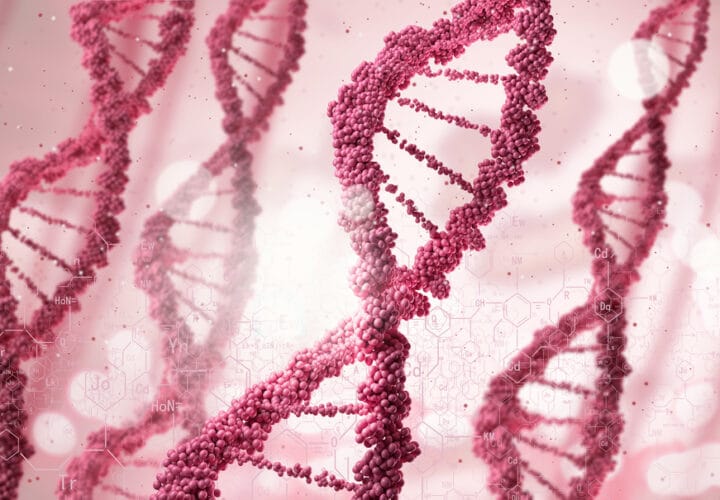"CRISPR-Cas9 is ... a readily available, highly specific, and cost-effective technology that has unquestionably changed what is possible in the investigation and potential treatment of devastating illness like Alzheimer’s disease." –Jean Paul Chadarevian & Amanda McQuade
Scientists are barreling toward a future in which, thanks to CRISPR, it is possible to edit the genetic make-up of brain cells to prevent Alzheimer’s disease.
Last month, in a petri dish study, researchers from Laval University in Canada discovered that, using CRISPR/Cas9 gene editing, they were able to alter a certain gene in nerve cells in the human brain and, in turn, control (and slow) the production of beta-amyloid protein, the protein that aggregates in toxic clumps at the onset of Alzheimer’s disease.
Jacques Tremblay, an author of the study and professor of molecular medicine at Laval University, and colleagues honed in on a genetic variant called A673T, which has been found to reduce Alzheimer’s likelihood by a factor of four, and which reduces Alzheimer’s biomarker beta-amyloid. The researchers employed a “search-and-replace” technique to successfully activate the A673T variant in about 40 percent of the lab-grown brain cells in their petri dish study. The next phase of investigation would be animal studies.
Gene editing and Alzheimer’s
Emmanuelle Charpentier and Jennifer A. Doudna first observed CRISPR, or Clustered Regularly Interspaced Short Palindromic Repeats, in the bacterial immune system, and described it in groundbreaking 2011 and 2012 publications.
This fall, the two women — Charpentier the director of the Max Planck Institute for Infection Biology in Berlin, and Doudna a biochemist at the UC Berkeley — received the Nobel Prize in Chemistry for their contribution to the field of genome editing.
Now, the CRISPR/Cas9 system — often referred to as “genetic scissors” which can cut or edit genes from human cells — is being leveraged in the effort to crack the code on Alzheimer’s. As of 2018, it had already shown promise in the treatment of other neurological disorders, such as Huntington’s disease, and was then being examined as a means of getting to the bottom of the urgent but long-standing question as to what causes Alzheimer’s.
“CRISPR-Cas9 is … a readily available, highly
specific, and cost-effective technology
that has unquestionably changed what
is possible in the investigation and potential
treatment of devastating illness like
Alzheimer’s disease.”
In an April study from the University of Tokyo, researchers employed it to delete individual genes in lab-grown mouse cells. After amending the cells, they then measured the quantity of beta-amyloid the cells produced.
“We believe this is the first time anyone has used this CRISPR/Cas9 genetic screening technique to look for changes in amyloid beta production,” Yukiko Hori, a co-first author on the research paper published in FASEB Journal and lecturer at the University of Tokyo, said in a news release at the time.
In June, a review suggested the technology may be “the light at the end of the tunnel” in the quest for an Alzheimer’s cure. Jean Paul Chadarevian & Amanda McQuade at UCI Mind write:
In the induced pluripotent stem cell (iPSC) Core led by Mathew Blurton-Jones at the UCI Alzheimer’s Disease Research Center, CRISPR-modified human cell lines are being used to investigate how Alzheimer’s risk factors influence human microglia. Most recently, doctoral candidate Amanda McQuade’s manuscript, “Gene expression and functional deficits underlie TREM2-knockout microglia responses in human models of Alzheimer’s disease,” was accepted for publication in Nature Communications. Her findings highlight that individual genetic changes in immune cells can drastically alter the ability of these cells to fight disease and suggests activation of the immune system in the early stages of disease may be beneficial for patients.
From the investigation of risk genes in various diseases, to the discovery of novel biomarkers, and even to the development of cell-based therapeutics, CRISPR-Cas9 is being used in research labs and biotech companies alike to revolutionize our science. It is a readily available, highly specific, and cost-effective technology that has unquestionably changed what is possible in the investigation and potential treatment of devasting illness, like Alzheimer’s disease.
Tremblay and his team at Laval said a limitation of this new research on the A673T gene is that it is unclear whether genetic editing at the time of onset of symptoms would be soon enough to make a difference, but that eventually he hopes the change could be made in sperm, eggs or embryos, ensuring that births to parents with Alzheimer’s genetic biomarkers are born with the A673T variant.




Question, my 82 year old mother was Diognostics with Alzheimer’s about 8 years ago and today she’s still healthy but can’t remember what she had fit breakfast , could she still benefit from a krisper operation ??
Are the Gene altering study accepting patients in their study group. 71 y/o f whose parents had alzheimers or early senility